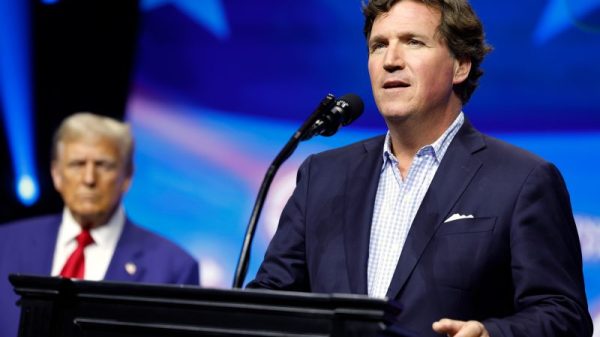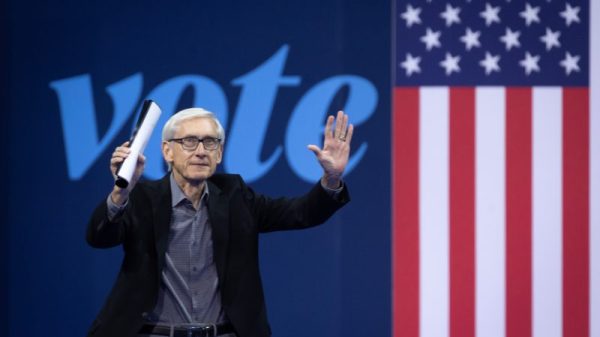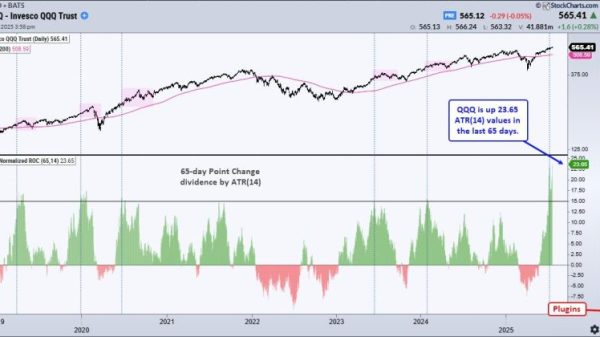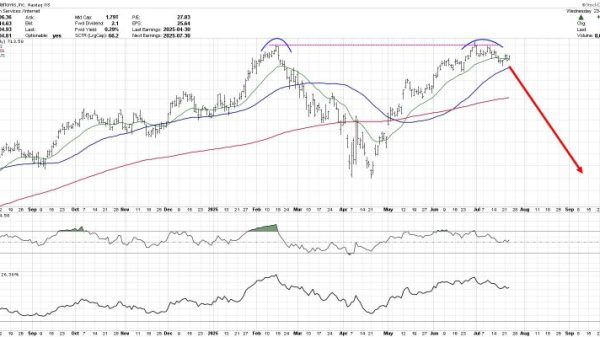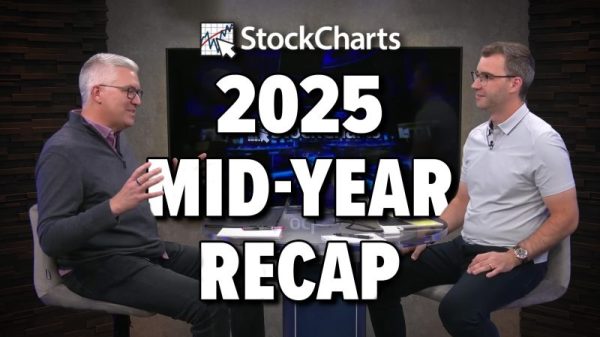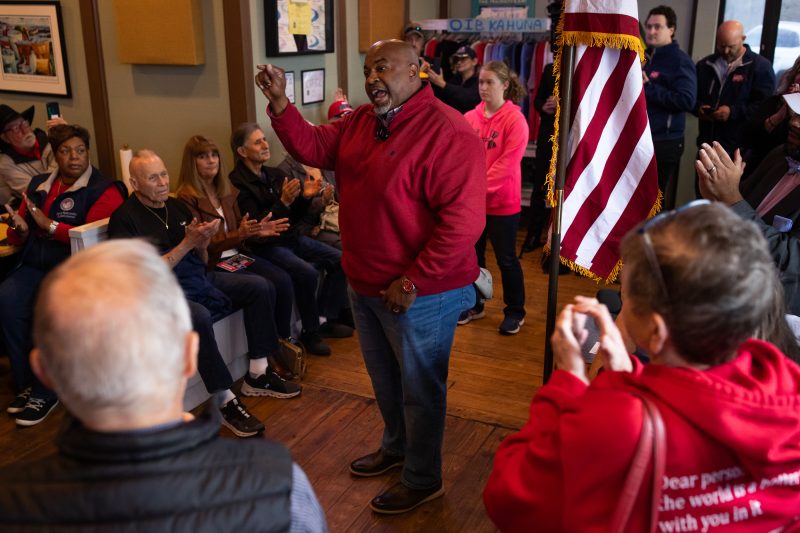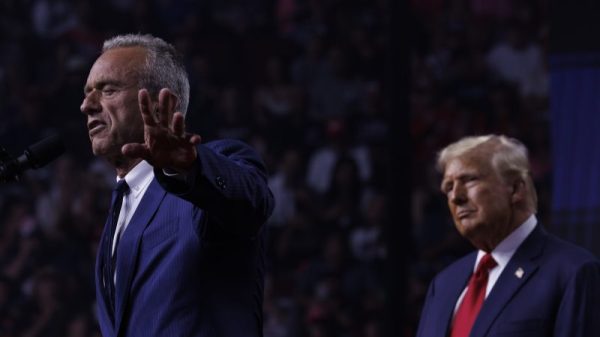OCEAN ISLE BEACH, N.C. — Surrounded by fans at a beach town bar, Mark Robinson addressed his absent critics. “Mark Robinson is not running to be governor to be a bully over anybody,” he said.
Left unmentioned: The deluge of offensive comments that made such a declaration necessary. There was the time he called school shooting survivors “media prosti-tots” for advocating for gun-control policies. The meme mocking a Harvey Weinstein accuser, and the other meme mocking actresses for wearing “whore dresses to protest sexual harassment.” The prediction that rising acceptance of homosexuality would lead to pedophilia and “the END of civilization as we know it”; the talk of arresting transgender people for their bathroom choice; the use of antisemitic tropes; the Facebook posts calling Hillary Clinton a “heifer” and Michelle Obama a man.
Even in a Republican Party that, under former president Donald Trump’s leadership, has often rewarded crude insults, baseless claims and incendiary language, Robinson stands out among candidates this year for the volume of his bigoted attacks and vicious diatribes. The lieutenant governor of North Carolina and the first Black person to hold the office, Robinson is heavily favored to clinch the GOP nomination for governor in next Tuesday’s primary.
He is expected to advance to a November showdown against Democratic Attorney General Josh Stein, who has a much more measured tone — setting up a clash that echoes the choice between Trump and President Biden. To many Republicans, Robinson, 55, is a conservative Christian firebrand with Trump-like appeal — a charismatic, brazen outsider who burst onto the political scene just a few years ago with a viral video. To others, he is a glaring liability in a battleground race where centrist voters are influential, and critics are alarmed at what he could do in the state’s top job.
“He is history’s latest example of someone trying to rise to power through hate,” said Dale Folwell, the Republican state treasurer, who is waging a long-shot campaign against Robinson.
With the general election nearing, Robinson is trying to move past his most inflammatory comments and focus on issues such as the economy. “It’s sad but not surprising that there’s no low the Democrats and their allies in the media won’t stoop to smear Mark Robinson,” Robinson campaign spokesman Mike Lonergan said in a statement. He said Robinson presents a sharp contrast with Stein as “a conservative outsider” who understands voters’ economic struggles and “will work every day to make our state a better place to live, work and raise a family.”
GOP foes regard his ascent as a damaging departure from other contests where party leaders boxed out risky candidates, and they note that efforts to restrict transgender rights have been an albatross for Republicans in North Carolina.
Wealthy attorney Bill Graham said he jumped into the gubernatorial race believing that national Republicans would help sideline Robinson, and he felt betrayed when they didn’t step in. “They’ll just play the Mark Robinson top-10 hit parade. They won’t need to say a word,” said Graham, predicting the Democratic strategy if Robinson is the nominee.
Supporters shrug off the reporting on Robinson’s most outrageous comments as smear jobs and “fake news.” When asked about one of Robinson’s most-scrutinized Facebook posts — a 2018 screed against the film “Black Panther” that references Israeli currency and uses a Yiddish slur for Black people — Ed Broyhill, a Republican national committeeman from North Carolina, said, “I can’t help but think that that’s been manufactured by some opposition.”
The post is still accessible online.
Robinson says he has “never been antisemitic,” and allies point to his trip to Israel last fall and talks with Jewish leaders as evidence he has sought to address concerns.
Some of Robinson’s comments have left a negative impression with voters that might be hard for him to undo. Nell Casper, 74, an independent voter from the Raleigh area wasn’t moved by Robinson’s recent efforts to back off from some old comments he called “poorly worded.” She said she would likely support the Democratic nominee.
“You can’t feel one thing and say it in front of the public … and then draw it back and not have people think about what you said in the first place,” Casper said. “Because you’ve hurt those people.”
In 2018, Robinson was a longtime factory worker who raged against the political left on Facebook with homemade memes and bombastic insults.
He chafed at assumptions that Black people were Democrats. He railed against Barack Obama’s unconventional presidential portrait — “a reflection of the nightmare of Marxist Socialism” — and embraced false claimsObama was not born in the United States. He joked that DACA, the acronym for Deferred Action for Childhood Arrivals, a program for undocumented immigrants who arrived in the United States as children, actually stood for “Dumb Ass Communist Americans.”
At a time when many Republicans in North Carolina believed a bitter fight over transgender people’s restroom use had cost them the governorship, Robinson was defiant. Responding to a trans protester with a poster asking where they should go to the bathroom, he uploaded a picture of himself smiling with his own cardboard sign: “OUTSIDE WITH THE DOG!”
In February of that year, a gunman killed 17 people at a high school in Parkland, Fla. Robinson began posting near-daily retorts to celebrities, politicians and surviving students who wanted new firearm laws.
When his hometown of Greensboro, N.C., considered canceling a gun show in response to the Parkland outcry, Robinson showed up to a city council meeting and gave a fiery, four-minute speech.
“I’ve heard a whole lot of people in here talking tonight about this group and that group and domestic violence and Blacks,” he said. “These minorities and that minority. What I want to know is, when are you all going to start standing up for the majority?” He pushed a finger to his chest. “I’m the majority. I’m a law-abiding citizen who’s never shot anybody!”
A video of Robinson spread on social media and caught the attention of the National Rifle Association, which put him in a commercial and brought him to Dallas to address its convention. Two years later, in 2020, he sailed to the GOP nomination for lieutenant governor.
“We’ve pushed back against the narrative that North Carolina’s a racist state, that America’s a racist nation,” he told a local news station that fall.
He alluded to the family story of hardship and perseverance that now features in his gubernatorial campaign pamphlets. They introduce Robinson as the ninth of 10 children who grew up amid poverty, alcoholism and domestic abuse and, at multiple points, declared bankruptcy.
“Only in America could a story like that exist, and I just count it as a huge blessing from God,” Robinson said.
When Trump rallied in Wilmington, N.C., before a crowd of thousands ahead of the 2022 midterms, he declared Robinson “one of the hottest politicians” in the country.
Trump has continued to praise Robinson, who visited the former president’s Mar-a-Lago Club in Florida in December for a fundraiser. At that event, the former president recounted once telling Robinson he was “better than Dr. Martin Luther King,” the Black civil rights leader, whom Robinson has criticized as a “communist.”
Robinson’s appeal on the right has resonated well beyond North Carolina. His reception at national conservative conferences rivaled that of some presidential candidates.
Campaigning at home,, Robinson has tried to focus on bread-and-butter issues. At his rally last month in Faison, he spoke at length about the economy and lamenting students’ low levels of proficiency in reading. He saved his sharpest rebukes for the media, gazing around to find the reporters present and accusing them of fixating on hot-button topics.
“Notice,” he said, “I haven’t said anything about transgender people. I haven’t said anything about any bathrooms. I talked about our economy, and now I’m talking about our education system.” The audience whistled and cheered as he grew combative.
“Lick your pencil and write facts!” he yelled.
But the audience cheered loudly when he raged against “diversity, equity and inclusion” and “agenda-driven junk” in schools. Down-ballot candidates — who flocked to campaign with Robinson — warned that the “family unit is under assault” and called to put “Bible and prayer back in the schools,” like in the early 1960s.
“I like how outspoken Mark is about values,” said David Crumpler, who attended Robinson’s event in Faison. He said he thinks a lack of “family values” is “the main thing that’s hurting us, not only this state but this country.”
Plenty of other Republican officials are uneasy about the prospect of Robinson leading the ticket.
“Listening to Republicans on and off Jones Street” — the hub of state government in Raleigh — there’s a sense that “while he may be the voice of the party, he’s not the voice of North Carolina,” said Jonathan Bridges, who managed former GOP congressman Mark Walker’s now-shuttered campaign for governor.
The GOP has swept Senate and presidential races in the Tar Heel State in recent years, yet Democrats have won the governor’s mansion in seven of the past eight election cycles.
The last Republican governor, Pat McCrory, faced massive blowback for signing a 2016 bill that required transgender people to use the bathroom matching their sex at birth. The law cost the state billions in business and was ultimately repealed — and Robinson’s critics say he will regret pushing LGBTQ+ issues to the forefront again.
A ban on gender-affirming care for minors took effect in North Carolina last year with much less public pushback. And Democrats, who see Robinson as a formidable rival, are largely focusing this year on his record on abortion.
“I don’t care if you’re 24 hours pregnant. I don’t care if you’re 24 weeks pregnant. I don’t care. If you kill that young’un, it is murder,” Robinson told a church in 2021. (Robinson has said he paid for the abortion of his “unborn child” in 1989 — a decision that he says was wrong.)
He “will be the most extreme candidate that is nominated for governor by either party in the last 50 years in North Carolina,” said Morgan Jackson, chief strategist for Stein, the state attorney general who is likely to face Robinson in the fall.
Lonergan, the spokesman for Robinson’s campaign, retorted that Stein “will be nothing but a rubber stamp for Joe Biden and the Democrats’ failing, far-left agenda.”
Robinson’s rivals have tried to convince Republican leaders and voters that he is damaging to their brand. Graham said he met with the Republican Governors Association last summer to explore a candidacy — offering himself as an alternative but arguing that he could only succeed with major, third-party spending against Robinson.
“The RGA was worried about Robinson. They may deny that, but they were,” Graham said.
Graham said he moved ahead under the impression that an outside spending campaign against Robinson was in the works. His chief strategist, Paul Shumaker, said the same and added that the RGA sought the Graham team’s input on a team to lead the effort. But no such spending materialized.
Courtney Alexander, a spokeswoman for the RGA, said the group has “traditionally stayed out of non-incumbent primaries” and “has had no involvement” in the GOP contest in North Carolina. She said the RGA has met with all of the Republican candidates and that any of them would be a stark contrast to the likely Democratic nominee.
Graham put his own money behind primary ads attacking Robinson for, among other things, “demeaning women” and “defending sexual predators.” Robinson asserted on a 2018 podcast that the political left is going after “the Harvey Weinsteins and the Bill Cosbys” to replicate Soviet-era intimidation.
They also highlight Robinson’s 2022 suggestion at a church that men, not women, are meant to be leaders. Acknowledging that he was “getting ready to get in trouble,” Robinson exclaimed to the congregation: “Called to be led by men!”
When “it was time to face down Goliath,” he added, God “sent David, not Davita.”
He later suggested it was “ridiculous” to conclude he did not view women as leaders and that he was only “encouraging men to stand up and take on the role of leadership as well.”







